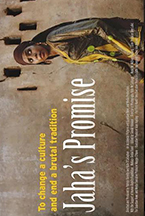JAHA’S PROMISE

(The Mill Valley Film Festival celebrated it’s 40th year on October 5-15. After a premiere at CPH:DOX and collecting prizes across Europe, Jaha’s Promise caught rave reviews at the Mill Valley Film Festival. HtN has forthcoming reviews from this always excellent fest so stay tuned…)
When Jaha Dukureh gave birth to a daughter, she tells the camera in the backyard of their Atlanta homestead, she made a promise to herself that her baby would not undergo the same routine horror she did as a girl in West Africa: female genital mutilation (referred to as FGM). Her native land of The Gambia, that country shaped like a needle pierced into Senegal, suffers from a staggering lack of resources in virtually all sectors. The devoutly Islamic regime of Yahja Jammeh, who tyrannized from 1984 until his removal by Senegalese troops at the beginning of this year, was perhaps best known internationally for its vociferous belief in capital punishment of all homosexuals. Indeed, almost every facet of love relations seems rigorously policed.
Through interviews with Jaha’s family members, neighbors, and friends, Jaha’s Promise shows that the value of a young woman in Gambian society is above all, her purity. Jaha’s father couldn’t have cared less that his daughters pursued a good education: in fact, he opposed this ambition but took pride in them for remaining chaste before marriage. He arranged for her to marry a thirty-something man living in New York when she was a mere eight years old; she emigrated for him at fifteen. Jaha’s own reflections, juxtaposed well with melancholic shots of Manhattan and a harrowing interview with the social worker who helped her escape that treacherous union, lay the groundwork for the horror with which she came to view her country’s practices. On her wedding night, she discovered she had not only been “cut” but also sewed up; the stitches binding the greater length of her labia had to be removed for the marriage to be consummated.
Once freed from this physically and emotionally violent spouse, but bereft of much of a support network in the city, Jaha was remarried to a man in Atlanta who helped her come to grips with the childhood trauma. It is after mounting an online campaign to urge President Obama to conduct an investigation into other naturalized Americans living with the painful effects of FGM that Jaha seems to been found by Jaha’s Promise makers, Patrick Farrelly and Kate O’Callaghan, an Irish-American duo. (The Guardian was one of the first major supporters of her cause, and their film unit latched on here as the production company.) Together, they brave the streets of Banjul and smaller Gambian towns asking men and women alike how they conceive of FGM and whether their opinions might be altered. The prevalence of superstition over education is at once riveting and heart-rending. “If a woman is not circumcised,” asks a midwife and circumciser they encounter on the street, “how will the baby be delivered?” Behind the camera, O’Callaghan employs a broadcast-ready mix of crisp talking-head close-ups and pristine B-roll for seasoning while commanding the viewer’s active engagement. Indeed, the film’s considerable strength lies in its incontrovertibly convincing message. In November 2015, Jammeh remarkably took note and made a speech exclaiming that after twenty-one futile years of trying to find a injunction for FGM in the Koran, he has decided to ban the practice nationwide.
– Joseph Pomp (@pompqmoq)









